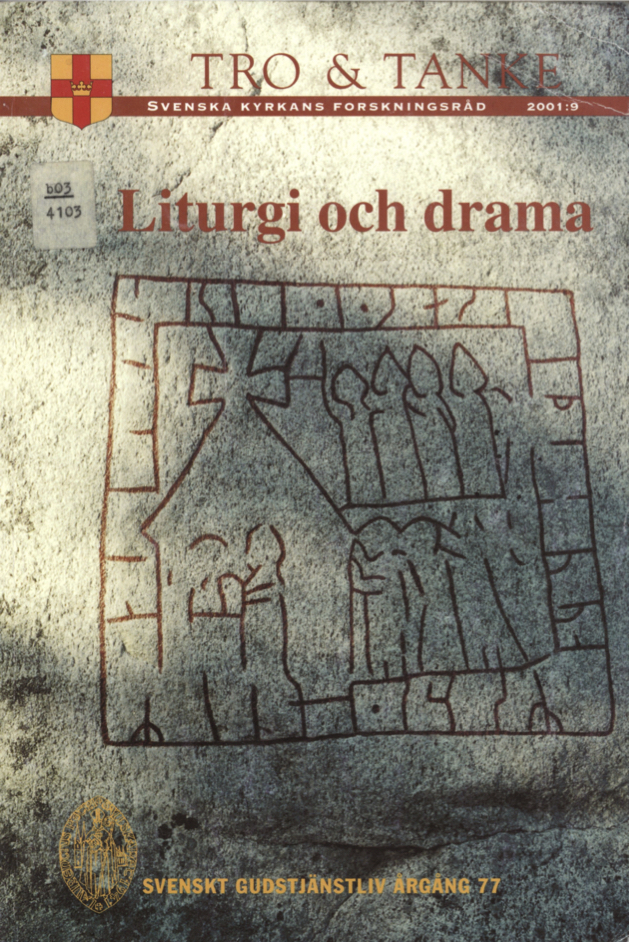Arne H. Lindgrens kyrkospel
Abstract
Arne H. Lindgren (1922-1991) wrote four liturgical plays for Lunds Stifts Kyrkospel (Liturgical Plays of the Diocese of Lund).
The first one is Den opassande lovsången (The Objectionable Song of Praise, 1977). It is a play with strong contrasts between voices and attitudes. In the prologue we meet Allan, a scrap-dealer, who turns out to be the man who lent Jesus his colt for Jesus’ last ride into Jerusalem. Another prologue sets the special time of the play: present and past are inseparable— everything is seen in a moment of presence.
In Den opassande lovsången some voices describe their experience of Christ. They tell us about the gift of identity, they show delight at singing and dancing and laughing. But other voices object to their joy. They ex press intolerance, repression, and scorn. All through the drama we meet this conflict between repression and joy. Christ is seen as the one who has identified himself with the common human being. When some voices claim the transcendence of God, one voice insists: “Someone is here— here by me!”
Fattigmässa (Mass of the Poor, 1978) is Lindgrens next liturgical play. It is called a church cabaret and is a bitter satire. Here we find no openness towards faith or human communion, no prayer, no presence of Christ. The “mass” of the title takes place at a shopping-centre, and the satire is directed against materialism, empty religiosity and society’s authorities. Fattigmässa ends abruptly with an apocalyptic threat which can be an allusion to nuclear war.
Himlen och hunden (Heaven and the Dog, 1979) resembles Den opassande lovsången with its lyrical parts and play with voices. The underlying biblical text is Mt. 15:21-28 where Jesus first rejects a Canaanite woman begging him to heal her daughter. But she argues with him saying: “...even the dogs eat the crumbs that fall from their masters’ table”. In the drama there are few open allusions to the dog of the title. It seems that “dogs” are ordinary, fragile people with easily exploited needs and unfulfilled longings. The division between “children” and “dogs” in the biblical text corresponds to the division between people “inside” and “outside” in the play.
Like the two former plays, Himlen och hunden attacks activity-neurosis, buying-hysteria and the military system. Himlen och hunden is darker than Den opassande lovsången but not as dark as Fattigmässa. It indicates no easy solutions, but a confidence in Christ.
All the liturgical plays of Arne H. Lindgren are filled with rage. In Duvomånglaren (The Dove-Monger, 1981) the rage burns throughout the play and culminates at the very end. The main character is one of the mongers who were driven out of the temple by the furious Christ. Since then he has sought Christ who made an ineffaceable impression on him. The play attacks expressions of consumer-culture in church and society, it assaults authorities of all sorts, the weapon-industry and the military. There are in the drama some “seekers” who have had an experience of Christ and now seek a living faith in Christ in the society of today. But representatives of the establishment are heavily opposed to them. In the last monologue the main character has understood the act of Christ in the temple. Every lash of the scourge was a lash for peace, for freedom and against oppression, profit, and exploitation. The dove-monger expresses his deep devotion to Christ.
As this survey shows, Arne H. Lindgrens liturgical plays are characterised by strong contrasts. In the centre we find the lonely, fragile individual— a seeker of faith and pure joy. Opposed to him we hear the voices of oppression and authority, of intolerance and pettiness. But Christ is on the lonely individual’s side. He understands, he struggles, he is there with his presence.
The plays are characteristic of the political movement of the 1970’s. Their call is not often heard in church and society anymore, though it is needed even more today than before.
Downloads
Publicerad
Nummer
Sektion
Licens
© författarna, Laurentius Petri Sällskapet för svenskt gudstjänstliv samt Artos & Norma bokförlag. Det är tillåtet att kopiera och använda material ur Svenskt Gudstjänstliv för forskningsändamål om källan anges. För övriga ändamål kontakta respektive artikelförfattare samt förlaget. Särskilda restriktioner kan gälla för bildmaterial.


